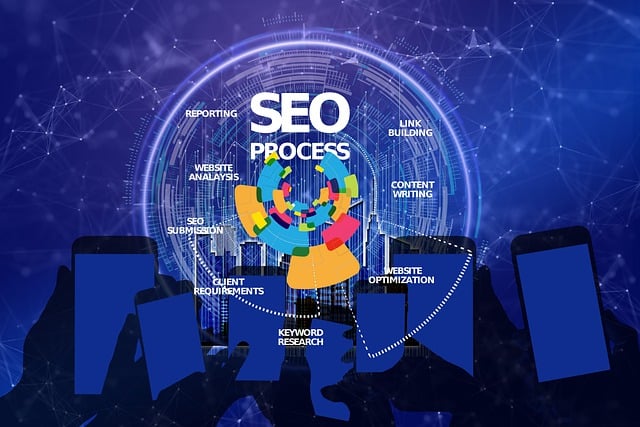Selecting the right SEO company is vital for e-commerce success in a competitive digital landscape. Look for firms specializing in online retail, offering tailored strategies, keyword research, on-page optimization, and compelling content creation. Top agencies stay ahead of algorithm changes, optimize for mobile and voice search, and leverage AI for precise targeting. Track KPIs like traffic growth and conversions to measure success. Partner with a company embracing future trends for sustained e-commerce SEO excellence.
In today’s digital landscape, a robust online presence is paramount for e-commerce success. Understanding Search Engine Optimization (SEO) is crucial for navigating this competitive space. This article guides you through the essentials of e-commerce SEO, highlighting key considerations when choosing an SEO company. From identifying top agency services to measuring success and exploring future trends, gain insights on how to optimize your online store’s visibility and drive sales. Learn what to look for and make informed decisions to propel your e-commerce business forward.
Understanding E-commerce SEO: The Basic Needs

In the dynamic landscape of e-commerce, successful online businesses understand that choosing an SEO company is more than just a marketing decision; it’s a strategic investment. Effective Search Engine Optimization (SEO) for e-commerce isn’t merely about increasing website traffic; it involves optimizing every facet of your digital store to enhance user experience and drive conversions. This includes optimizing product titles, descriptions, and URLs to ensure they are not only search engine-friendly but also compelling to potential customers browsing your online platform.
The basic needs of e-commerce SEO revolve around improving visibility, increasing organic traffic, and boosting sales. A proficient SEO company will employ a multi-faceted approach that includes keyword research to identify the terms your target audience is using when searching for products or services like yours. They’ll also implement on-page optimization techniques, such as meta tag management and content creation strategies, to ensure your e-commerce site aligns with search engine algorithms while delivering valuable information to visitors.
What to Look for in an SEO Company for E-commerce

When choosing an SEO company for your e-commerce business, look for experts who understand the unique dynamics of online retail. The digital landscape is ever-evolving, and a top-tier SEO firm should stay ahead of algorithm updates, ensuring your website remains optimized. Seek companies that offer tailored strategies specific to e-commerce platforms, as this industry requires specialized knowledge.
Effective SEO services for e-commerce include comprehensive keyword research to identify high-value terms, competitive analysis to understand market positioning, and on-page optimization to ensure product pages are search engine-friendly. Additionally, a robust content creation strategy is vital to engage customers and improve conversion rates. Look for providers who can demonstrate success in boosting online visibility and driving sales for e-commerce brands similar to yours.
Key Services Provided by Top E-commerce SEO Agencies

When choosing an SEO company for your e-commerce platform, look out for agencies that offer a comprehensive suite of services tailored to drive sales and boost online visibility. Top e-commerce SEO agencies typically provide keyword research and optimization, which involves identifying high-value keywords and strategically integrating them into your website content, product titles, and meta descriptions. This ensures your store appears in relevant search results, attracting potential customers who are actively looking for your products or services.
Another crucial service is on-page and off-page optimization. On-page SEO focuses on improving individual webpage elements like headings, images, and content to enhance user experience and search engine readability. Off-page SEO, on the other hand, involves building high-quality backlinks from authoritative websites, which signals to search engines that your e-commerce site is a credible source of information. Reputable agencies also offer pay-per-click (PPC) management services to maximize visibility during paid advertising campaigns and drive targeted traffic to your store.
Measuring Success: Key Performance Indicators (KPIs) for E-commerce SEO

When evaluating the success of your e-commerce SEO efforts, understanding and tracking Key Performance Indicators (KPIs) is essential. These metrics provide valuable insights into the effectiveness of your digital marketing strategy. One of the primary KPIs to focus on is traffic growth; a reputable SEO company should demonstrate an increase in organic visitors over time. This can be measured by tracking monthly unique visitors and their sources, ensuring a steady rise indicates successful optimization.
Conversions are another critical aspect; choosing an SEO company that specializes in e-commerce will help optimize your site for higher sales or desired actions. KPIs like the bounce rate, average session duration, and pages per session offer a comprehensive view of user engagement. A well-optimized website aims to keep visitors engaged, leading to improved conversion rates over time. Regularly monitoring these KPIs allows for data-driven decisions and ensures the SEO company is delivering measurable results.
Strategies and Trends Shaping the Future of E-commerce SEO

The future of e-commerce SEO is being shaped by a dynamic interplay of strategies and trends. One prominent trend is the increasing importance of mobile optimization. With more shoppers transitioning to mobile devices, ensuring your e-commerce site is seamless and fast on smartphones and tablets is crucial. Voice search optimization is another rising star, as voice assistants like Alexa and Google Home gain popularity. Optimizing for long-tail keywords and creating content that answers user queries naturally will enhance visibility in these environments.
Additionally, artificial intelligence (AI) and machine learning are playing a significant role in SEO. AI-powered tools can analyze vast amounts of data to identify patterns and trends, enabling more precise keyword targeting and personalized content delivery. Personalization is another key trend—tailoring experiences for individual users based on their browsing history and preferences not only enhances user satisfaction but also drives conversions. Choosing an SEO company that stays ahead of these trends and employs innovative strategies will be vital for e-commerce businesses aiming to thrive in the competitive online marketplace.
Choosing the Right SEO Partners: A Step-by-Step Guide

When it comes to boosting your e-commerce business’s online visibility, selecting the ideal SEO partners is a strategic move that can significantly impact your success. Here’s a step-by-step guide to help you navigate this process:
1. Define Your Objectives: Begin by clearly outlining your SEO goals. Do you aim to increase organic traffic, boost sales, or improve brand awareness? Understanding these objectives will help you find an SEO company that aligns with your vision. Look for partners who specialize in e-commerce SEO and have a proven track record of delivering results tailored to this industry.
2. Research and Evaluate: Conduct thorough research to create a shortlist of potential SEO companies. Check their websites, client testimonials, case studies, and industry recognition. Assess their expertise by examining the types of services they offer, such as keyword research, on-page optimization, technical SEO, and link building. Ensure they stay updated with the latest Google algorithms and trends to avoid outdated strategies.
3. Communication and Understanding: Effective communication is key. Reach out to potential partners and discuss your business needs. Ask about their process, tools, and strategies. A good SEO company should provide transparent reports, regular updates, and be open to your queries. They should also offer personalized recommendations based on your unique e-commerce platform and target audience.
4. Experience and Results: Consider the company’s experience in the industry and their success stories. Look for long-term partnerships with satisfied clients as a sign of reliability. Request case studies or references to understand their approach and the results they’ve achieved for similar businesses.
